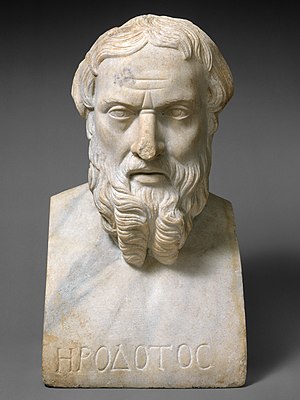
The rule of the people has the fairest name of all, equality (isonomia), and does none of the things that a monarch does. The lot determines offices, power is held accountable, and deliberation is conducted in public.
Share this quote:
It is the greatest and the tallest of trees that the gods bring low with bolts and thunder. For the gods love to thwart whatever is greater than the rest. They do not suffer pride in anyone but themselves.
Share this quote:
Great wealth can make a man no happier than moderate means, unless he has the luck to continue in propsperity to the end. Many very rich men have been unfortunate, and many with a modest competence have had good luck. The former are better off than the latter in two respects only, whereas the poor but lucky man has the advantage in many ways; for though the rich have the means to satisfy their appetites and to bear calamities, and the poor have not, the poor, if they are lucky, are more likely to keep clear of trouble, and will have besides the blessings of a sound body, health, freedom from trouble, fine children, and good looks.Now if a man thus favoured died as he has lived, he will be just the one you are looking for: the only sort of person who deserves to be called happy. But mark this: until he is dead, keep the word “happy” in reserve. Till then, he is not happy, but only lucky.
Share this quote:
Seventy years I regard as the limit of the life of man. In these seventy years are contained, without reckoning intercalary months, twenty-five thousand and two hundred days. Add an intercalary month to every other year, that the seasons may come round at the right time, and there will be, besides the seventy years, thirty-five such months, making an addition of one thousand and fifty days. The whole number of the days contained in the seventy years will thus be twenty-six thousand two hundred and fifty, whereof not one but will produce events unlike the rest. Hence man is wholly accident.
Share this quote:
Death is a delightful hiding-place for weary men.
Share this quote:
The Persians are very fond of wine ... It is also their general practice to deliberate upon affairs of weight when they are drunk and then in the morning when they are sober the decision to which they came the night before is put before them by the master of the house in which it was made and if it is then approved they act on it if not they set it aside. Sometimes however they are sober at their first deliberations but in this case they always reconsider the matter under the influence of wine.
Share this quote:
It is better to be envied than pitied.
Share this quote:
It is better by noble boldness to run the risk of being subject to half the evils we anticipate than to remain in cowardly listlessness for fear of what might happen.
Share this quote:
Very few things happen at the right time and the rest do not happen at all the conscientious historian will correct these defects.
Share this quote:
This is the worst pain a man can suffer: to have insight into much and power over nothing.
Share this quote:
Neither snow nor rain nor heat nor night stays these couriers from the swift completion of their appointed rounds.
Share this quote:
Great deeds are usually wrought at great risks.
Share this quote:
The destiny of man is in his own soul.
Share this quote:
In peace sons bury their fathers in war fathers bury their sons.
Share this quote:
Neither snow nor rain nor heat nor gloom of night stay these couriers from the swift completion of their appointed rounds.
Share this quote:
In peace, sons bury their fathers. In war, fathers bury their sons.
Share this quote:
Force has no place where there is need of skill.
Share this quote:
Death is a delightful hiding place for weary men.
Share this quote:
It is clear that not in one thing alone, but in many ways equality and freedom of speech are a good thing.
Share this quote:
To think well and to consent to obey someone giving good advice are the same thing.
Share this quote: